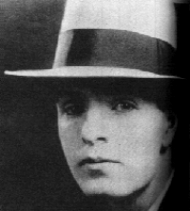 Of all the authors whose forte was turning our spines to columns of ice, the supreme master of the art, the Alfred Hitchcock of the written word, was Cornell Woolrich. His centenary will be celebrated around the time this collection is published. Whatever honors he receives on that occasion will have been richly deserved. He was born on December 4, 1903 in New York City, and during his adolescence he lived with his grandfather and aunt and mother. In 1921 he enrolled in Columbia College and in his junior year began the first draft of a novel. When it sold a few months later, he quit Columbia to pursue the dream of bright lights.
Of all the authors whose forte was turning our spines to columns of ice, the supreme master of the art, the Alfred Hitchcock of the written word, was Cornell Woolrich. His centenary will be celebrated around the time this collection is published. Whatever honors he receives on that occasion will have been richly deserved. He was born on December 4, 1903 in New York City, and during his adolescence he lived with his grandfather and aunt and mother. In 1921 he enrolled in Columbia College and in his junior year began the first draft of a novel. When it sold a few months later, he quit Columbia to pursue the dream of bright lights.
During his early career he published six novels. His second, Children of the Ritz (1927), won first prize of $10,000 in a contest cosponsored by College Humor magazine, which serialized it, and First National Pictures, which filmed the story in 1929. Woolrich was invited to Hollywood to help with the adaptation and stayed on as a staff writer. After his sixth novel, Manhattan Love Song (1932), Woolrich sold next to nothing. But at that moment he was on the brink of a new life as a writer, one so different from his earlier literary career that decades later he said it would have been better if all his pre-suspense fiction "had been written in invisible ink and the reagent had been thrown away." He was about to become the Poe of the twentieth century and the poet of its shadows.
Between 1934 and 1939 Woolrich sold at leas 105 stoies as well as two book-length magazine serials, and by the end of the decade he had become a fixture in mystery pulps of all levels. In these tales Woolrich created, almost from scratch, the buidling-blicks of the literature we have come to call noir. In 1940 he joined the migration of pulp detective writers from lurid-covered magazines to hardcover books with his so-called Black Series: The Bride Wore Black (1940), The Black Curtain (1941), Black Alibi (1942), Black Angel (1943), Black Path of Fear (1944), and Rendezvous in Black (1948). In the early forties the entrepreneurs of dramatic radio and films discovered that countless Woolrich stories were naturals for adaptation and began buying from him the rights to stories like "It Had To Be Murder" (1942) which became the basis for the Hitchcock film Rear Window (1954).
In fact, Woolrich continued to write more novels than could be published under a single byline and came up with the pseudonym William Irish. The novels published under the Irish byline were Phantom Lady (1942), Deadline at Dawn (1944), Night has a Thousand Eyes (1945), Waltz into Darkness (1947), and I Married a Dead Man (1948). The success of his novels led to publication of several collections of his shorter work in hardcover and paperback volumes. In addition, fifteen movies were made from Woolrich material between 1942 and 1950 alone and his influence pervaded the culture of the forties so extensively that many film noir classics of that period give the sense of having been adapted from his work even though he had nothing to do with them.
Woolrich published little new after 1948, apparently because his long absent father's death and his mother's prolonged illnesses paralyzed his ability to write. Woolrich's personal situation remained wretched, and more than once he sank to passing off slightly updated old stories as new work, fooling book and magazine publishers as well as readers. Diabetic, alcoholic, wracked by self-contempt, and alone after his mother's death in 1957, Woolrich dragged out his life. In the late sixties Woolrich had plenty of money and his critical reputation was secure not only in America but in Europe, but his psysical and emotional condition remained hopeless. He died of a stroke on September 25, 1968.
--FRANCIS M. NEVINS, ed. from Night & Fear:
A Centenary Collection of Stories by Cornell Woolrich.